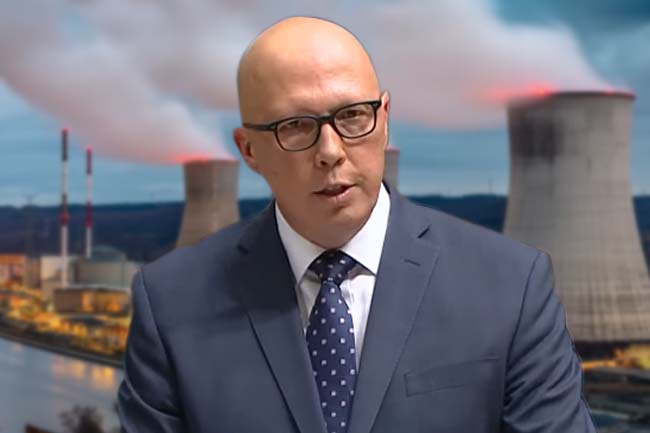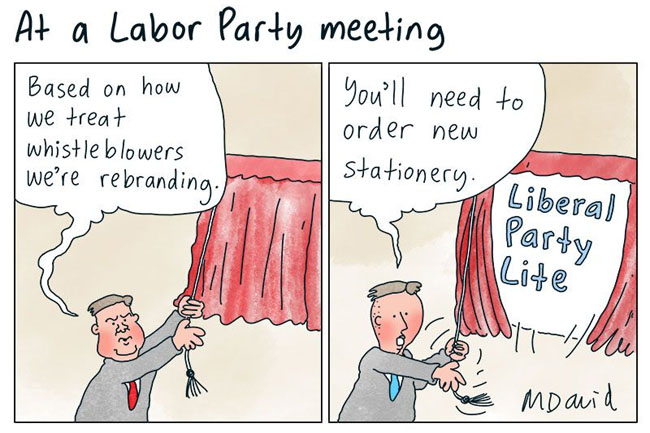The 2020 Budget has been met with an underwhelming reception largely due to the backward-thinking ideas of our government, writes Professor John Quiggin.
TUESDAY EVENING was “the most momentous Budget in Australian history”. Looking at the front pages of the main news sites today, the Budget barely gets a mention. This historic event was overshadowed by the Vice-Presidential debate in the United States (usually about as significant as the curtain-raiser game before a Grand Final) and by the continuing travails of James Packer.
To see why the Budget has sunk without trace, a thought experiment might come in handy.
Suppose that the bushfire catastrophe of last summer had never happened (or that the fires were swiftly brought under control) and COVID-19 had fizzled in the same way as previous potential pandemics. Suppose also that the economy had grown strongly enough that the surplus was much bigger than the Government had promised. Would anything, apart from the headline deficit number, have been any different?
The answer is, almost certainly not. The Stage Two tax cuts, mostly benefitting those in the top half of the income distribution, would almost certainly have been brought forward as they were on Tuesday night. There would have been big-ticket transport infrastructure projects on which to spend some of the additional surplus. There would have continued stringency in areas like aged care and social along with crumbs, at best, for perceived enemies like universities and the cultural sector.
Considered as a policy of fiscal stimulus, the Budget makes no sense. The Government has already cut back the JobSeeker and JobKeeper programs, even though nearly all of the money paid out under these programs would be spent by the recipients.
By contrast, the taxpayers who will benefit from the accelerated tax cuts are those who have kept their jobs and whose main difficulty is that outlets for spending have been limited by the pandemic. Households in this group have been building up savings and paying down debt and will doubtless make the same use of the extra net income from the tax cuts.
The central focus on road construction is similarly backward-looking. The pandemic has had its biggest impact on service sectors like hospitality, the arts and universities. It has also revealed drastic shortcomings in aged care, public health and serious inequalities in school education. Yet none of these sectors could compete against the appeal of a photo opportunity in a hard hat, provided by yet another “congestion-busting” expansion of the road network.
There is a similar absence of any rethinking regarding climate change. The catastrophic bushfires (not only in Australia but in California and elsewhere) have had no impact on the Government’s thinking. The measures announced in the budget were almost entirely symbolic, aimed at placating the Government’s Right-wing base while edging away from electoral liabilities like nuclear and coal-fired power.
The allocation of $50 million to carbon capture and storage is a prime example of the gesture politics that dominate this Budget. This measure enables the Government to maintain a public commitment to “clean coal” and to claim a “stretch goal” of reducing the cost of CCS to $20/tonne of carbon dioxide sequestered. But the Coal21 program, set up by John Howard in 2006, spent $500 million on the same goal to no effect before it was scrapped in Joe Hockey’s first Budget in 2014. Billions more have been spent on unsuccessful pilot projects in the U.S. and Canada, to no effect.
The Government’s rapid and effective response to the pandemic in March and April showed a willingness to think creatively and dump ideological dogma when faced with an urgent crisis. But, as soon as the immediate emergency was over, the Government returned to the lazy thinking of the past. Our leaders have no capacity to respond to the world we are actually facing in the wake of the pandemic and with the climate emergency looming ever larger. Worse than that, they have no interest in thinking about possible solutions.
Our best hope is that more imaginative ideas, centred around the idea of a Green New Deal, are being put forward in Europe and by the Democratic Party in the U.S. Our government will try to ignore these developments as long as possible. But without new policy thinking, it is doomed to fail.
John Quiggin is Professor of Economics at the University of Queensland and the author of 'Zombie Economics and Economics in Two Lessons'. You can follow John on Twitter @JohnQuiggin.
Related Articles
- The Coalition’s latest trillion-dollar tax cuts Budget promo
- MUNGO MACCALLUM: Budget 2020 — Coalition jettisons debt cult mantra for jobs
- Budget 2019: Short term sugar hits without national long-term vision
- Turnbull Government Budget continues foreign aid neglect
- #Budget2017IA: The future tax con job
 This work is licensed under a Creative Commons Attribution-NonCommercial-NoDerivs 3.0 Australia License
This work is licensed under a Creative Commons Attribution-NonCommercial-NoDerivs 3.0 Australia License
Support independent journalism Subscribe to IA.













